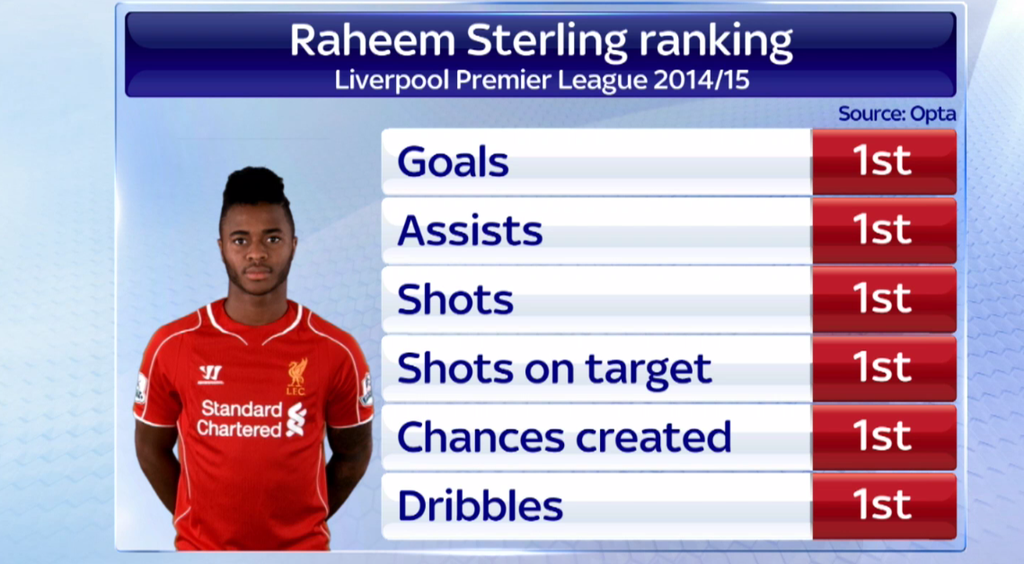Raheem Sterling is a money grabber and so are you
April 2, 2015
Raheem Sterling and Liverpool have come to an impasse. He would like more money, and perhaps a different club, and they would like him to stay for the money he’s currently on. Sterling, who is 20 years old with 14 England caps and in his third full season with the club, is currently making £35,000 a week and has reportedly turned offers from £100,000 a week to £180,000 a week.
All of those figures are high for a player his age. So why does he think he’s worth so much? Here’s where he ranks amongst Liverpool players in a few key stats this season…

Despite that, and the apparent interest of other clubs, many people still believe he’s out of line for not just being satisfied with whatever Liverpool are willing to give him. So after being taken to task by fans and members of the media, Sterling decided to do a BBC interview without prior consent from Liverpool in order to tell his side.
From the BBC:
“It’s not about the money at all,” the England forward said.
“It’s never been about money. I talk about winning trophies throughout my career. That’s all I talk about.”
He added: “I don’t talk about how many cars I’m going to drive, how many houses I’ve got. I just purely want to be the best I can be.” […]
“I don’t want to be perceived as a money-grabbing 20-year-old,” said the player, who has two years left on a contract worth £35,000 a week.
The fear of being perceived as greedy is likely real, but to say that a major decision about his career isn’t at all about money is absurd. It most definitely is about the money, at least in part, and it should be. Money is an integral part of job decisions for everyone. If another employer offers you more money than your current employer, whether you’re a janitor or the CEO of a major corporation, everyone you know will automatically accept that as reason enough to change places of employment.
But we don’t allow professional athletes to do this. They are supposed to do their jobs for the love of it and remain loyal to clubs that only use them for as long as they’re useful and fans who will threaten their lives the second they underperform. If they’re so much as suspected of wanting to change teams for a more lucrative contract, they’re labeled mercenaries and subhuman.
Why? Because whatever they’re getting paid is presumably more than the average person in the stands could ever comprehend possessing. And to get that for playing a game we pay to watch means they are beyond lucky and should always be supremely grateful for everything, even if the market suggests otherwise. Then again, our intense interest in their talents is the reason they’re getting paid so much in the first place.
“Discontent for money is a trick of the rich to keep the poor without it,” Michael Corleone said. And though Premier League footballers aren’t poor, they’re certainly far less wealthy than the men who write their checks. Their careers can end at any moment with one bad challenge and, at most, the trade they’ve devoted their entire lives to learning will be a distant memory come middle age. They have an extraordinarily brief window to earn as much money as possible before facing an uncertain future and the very real possibility having to make that money support their families for decades.
But instead of understanding this and being happy when young people are able to get their proportional slice of an ever growing pie, we condemn them for it, unwittingly helping club owners keep that revenue firehose aimed directly into their own accounts.
It’s the clubs who leak these stories of players rejecting their generous offers in the hopes that public pressure can be used to guilt them into accepting less money and dupe them into thinking that loyalty will keep them warm after they retire. It’s a trick. And we help carry it out while those same owners use other tricks on us (three shiny new kits every season and ever rising ticket prices, because there’s always someone else to take your seat if you don’t want to pay!).
We’re all money grabbers to varying degrees. For the sake of ourselves and our loved ones, we have to be. And Raheem Sterling, who, by the way, has a young daughter, is no different.
